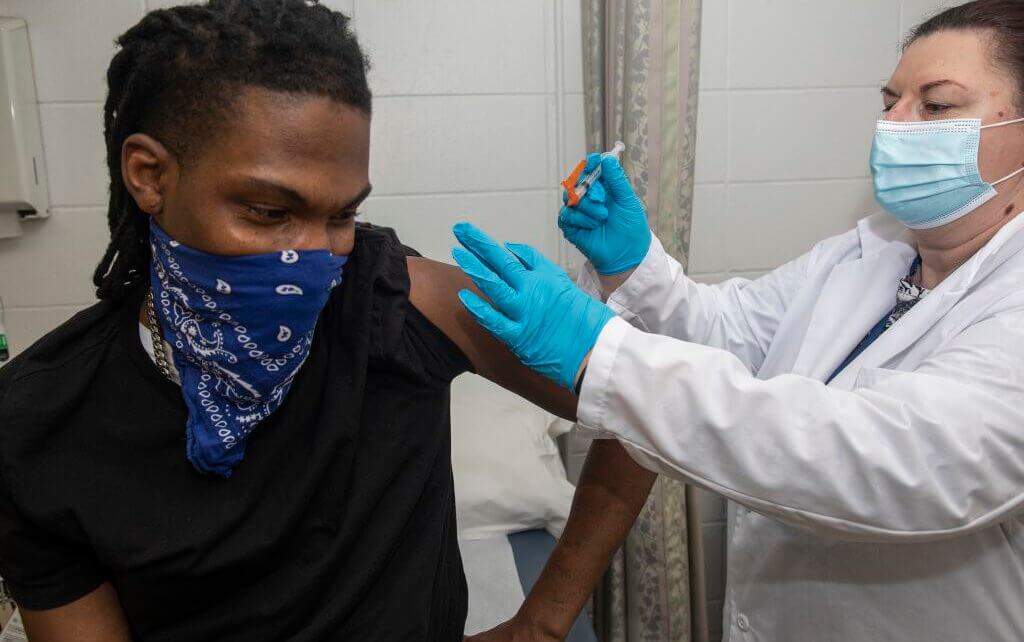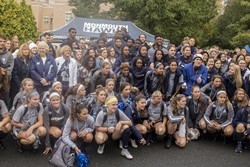Monmouth University will require all students, faculty, and staff to get the appropriate booster dose for their initial COVID vaccination series by Tuesday, March 1. Students who do not receive their appropriate booster dose by March 1 will be subject to a weekly testing requirement and will have to quarantine if exposed to a COVID-positive individual.
The decision to mandate booster doses was made in light of waning immunity considerations for fully vaccinated individuals two to five months after receiving their initial vaccine. According to the Centers for Disease Control and Prevention (CDC), the Moderna, Pfizer, and J&J vaccines become less effective against COVID over time and require a booster dose to continue to sufficiently protect recipients against the virus.
“Our experience right now is that if you’re not vaccinated at all, COVID is harder on you,” said Mary Ann Nagy, Vice President for Student Life and Leadership Engagement. “If you’re vaccinated but not boosted, you may still get it but it may be less hard on you. The folks who seem to have the most mild experience are those who are vaccinated and boosted. The more protection you have, the less likely you are to feel the effects.”
The American College Health Association recommends requiring a booster, citing that the booster is necessary to reduce the severity of illness, protect high risk populations, decrease the strain on healthcare resources, and reduce the risk of emerging variants.
“That’s the part that people who remain unvaccinated may not realize. As long as you are unvaccinated, you become a host to the virus and allow it to mutate,” explained Kathy Maloney, Director of Health Services.
“I think the biggest change that you are going to see in the spring semester is a requirement that in order to be considered fully vaccinated, you have to be boosted,” said Nagy. “Based on the new guidance from the CDC and the New Jersey Department of Health, until I am up to date in my vaccinations, boosted and vaccinated, I now have to quarantine for five days if I come in direct contact with a COVID positive person. That means that I can’t go to class, I can’t go to athletic events, I can’t use the fitness center, I can’t use the library. I basically have to shelter in place. That is different than what it was in the fall semester.”
Students are still able to apply for medical and religious exemptions for both the initial vaccine and the booster dose, although the University is no longer accepting the Emergency Use Authorization (EUA) exemption. Students, staff, and faculty had previously been able to refuse the COVID vaccine on the basis that it was too new and did not yet have proper approval.
“Because there is now FDA and CDC approval, the EUA has been lifted,” explained Nagy. “Folks who initially took the EUA have been contacted and told that they can’t use that anymore.”
“Having that as a reason is no longer valid, it’s time to move on,” added Maloney. “Now you have millions of people who are vaccinated and it has a safety profile. It’s being given to pregnant women and very small children, so it’s not a valid exemption anymore.”
The University will continue to offer vaccine clinics, both for the initial vaccine doses and for the booster. The next on-campus clinic will take place on Thursday, Jan. 27 in the Rebecca Stafford Student Center and is being hosted in conjunction with the Monmouth County Regional Health Commission and Visiting Nurse Association of Central Jersey (VNACJ). Additionally, the Monmouth County Health Department will be offering walk-in clinics during the month of January.
“We are committed to doing monthly vaccination clinics, as long as our community partners at the VNA and the regional health commission are willing to do it,” said Maloney. “It really comes down to getting vaccinated, getting boosted, and staying masked around others.”




